FINE FOWL
Field to table, nose to tail — why these KZN birds take the plate
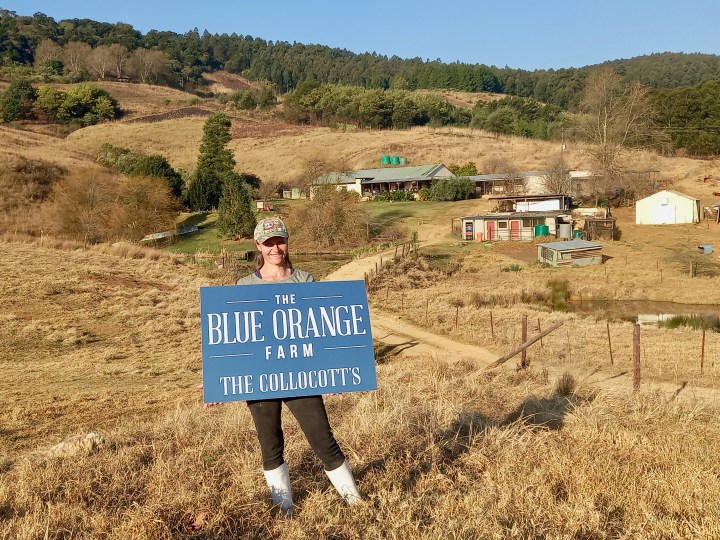
Vanessa’s chickens and Vanessa’s ducks are on the menu at some of the best establishments. We journey to the middle of nowhere to meet the ebullient, down-to-earth, hands-on farmer who produces her poultry, from start to slaughter, the humane way.
Who would have thought that watching chickens have their throats cut by a guillotine-like device would whet my appetite and have me fantasising about farmer Vanessa Collocott’s birds? Their lifeless bodies submerged in boiling water, their feathers extracted by a whirling plucking machine. Their generous naked broiler-bods methodically, expertly and individually surgically slit, their innards extracted, the good bits cleaned and washed (did you know the only way to tell if a chicken truly is free-range is to look in the contents of the stomach for grass, which you will seldom find in those purported to be, simply because few are), their heads and feet severed and transmogrified into walkie-talkies.
The chickens, which she buys in brooded when they are four weeks old, then pasture in the field in mobile chicken coops, which are moved every day so that, while protected from predators and extreme weather, the broilers are out in the open, the sunshine, in a field surrounded by electric fencing. Safe to peck, grub, scratch, poop and regenerate the soil. And grow, in a matter-of-fact way, to their order size — as in being ready for the pot.
Her Pekin ducklings, which she gets in as day-olds, she has in her ambit living the duck’s life for 48 days. They start in the brooder, are moved at two weeks into mobile poultry coops and subsequently have the run of her lawn — before being relocated to the dam at three to four weeks old where they swim free until it’s their time to be prepared for plate and palate.
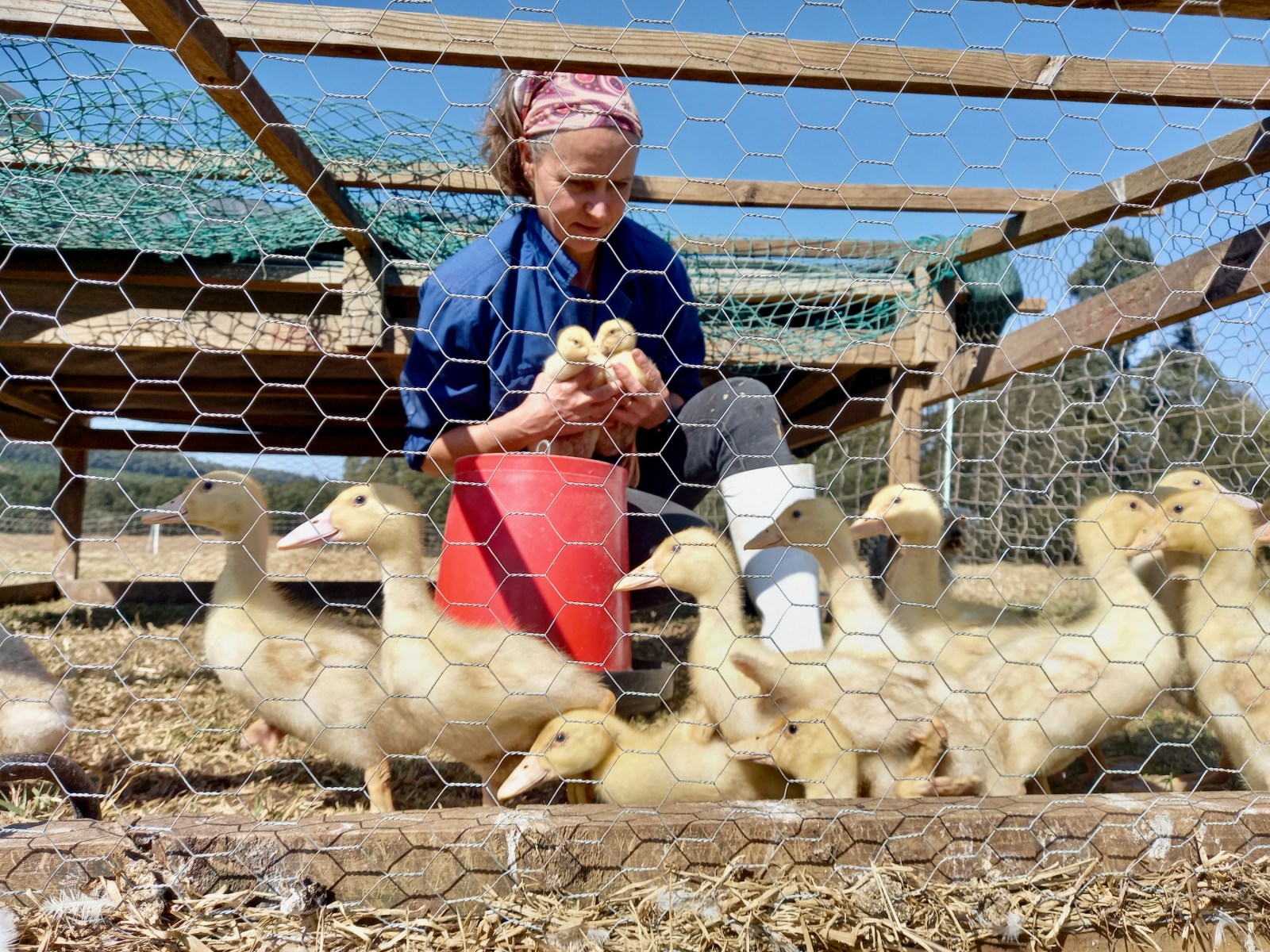
Vanessa Collocott checks on the two-week-old ducklings, which will soon be ready to transfer to her lawn and then the dam. (Photo: Wanda Hennig)
“Ducks are safer than chickens in terms of predators,” she says. “Birds of a feather flock together… it’s like that with ducks. They swim together in a mass so the predators don’t strike.” This till they’re ready for their quick little side-trip into the farm abattoir where they are processed in much the same way as the chickens “but with more hand-plucking of feathers”.
The Pekin duck, some readers will know, is the world’s most popular breed of meat duck, not to be confused with Peking duck, the famous Chinese dish characterised by its thin, crispy skin (for which Pekin ducks are often used).
“I am licensed to do 50 birds a day, five days a week.” Which in her world works out to 40 ducks and 200 chickens a week. All niche and personal.
Two-week-old ducklings are the first thing Vanessa shows me after she has picked me up, truly in the middle of nowhere, which I say because while I find The Blue Orange Farm on Facebook, my tried-and-trusted phone GPS draws a blank when I plug in the name. Vanessa sends me a pin. Then when I arrive at a shut gate along an entangled rutted dirt road and call her — the 20ha smallholding is in Curry’s Post, somewhere between Mooi River and Howick — she tells me to push open the palisade gate, close it behind me. Then as soon as I see a spot to pull off the dirt track, to park my car. “You will never get down or up our road. I will come fetch you.”
She had threatened to collect me by tractor when I met her at Jackie Cameron’s School of Food & Wine graduation a couple of weeks earlier. I asked her then if I might visit, intrigued by “Vanessa’s chicken” and “Vanessa’s duck”, on the menu at Chef Johannes Richter’s The LivingRoom [see In the kitchen with SA’s top chef at SA’s top restaurant].
Instead of the tractor, she arrives in a rugged 4X4 truck, all smiles and laughter, a ragged white pooch called Flea on her lap, head stuck out the window.
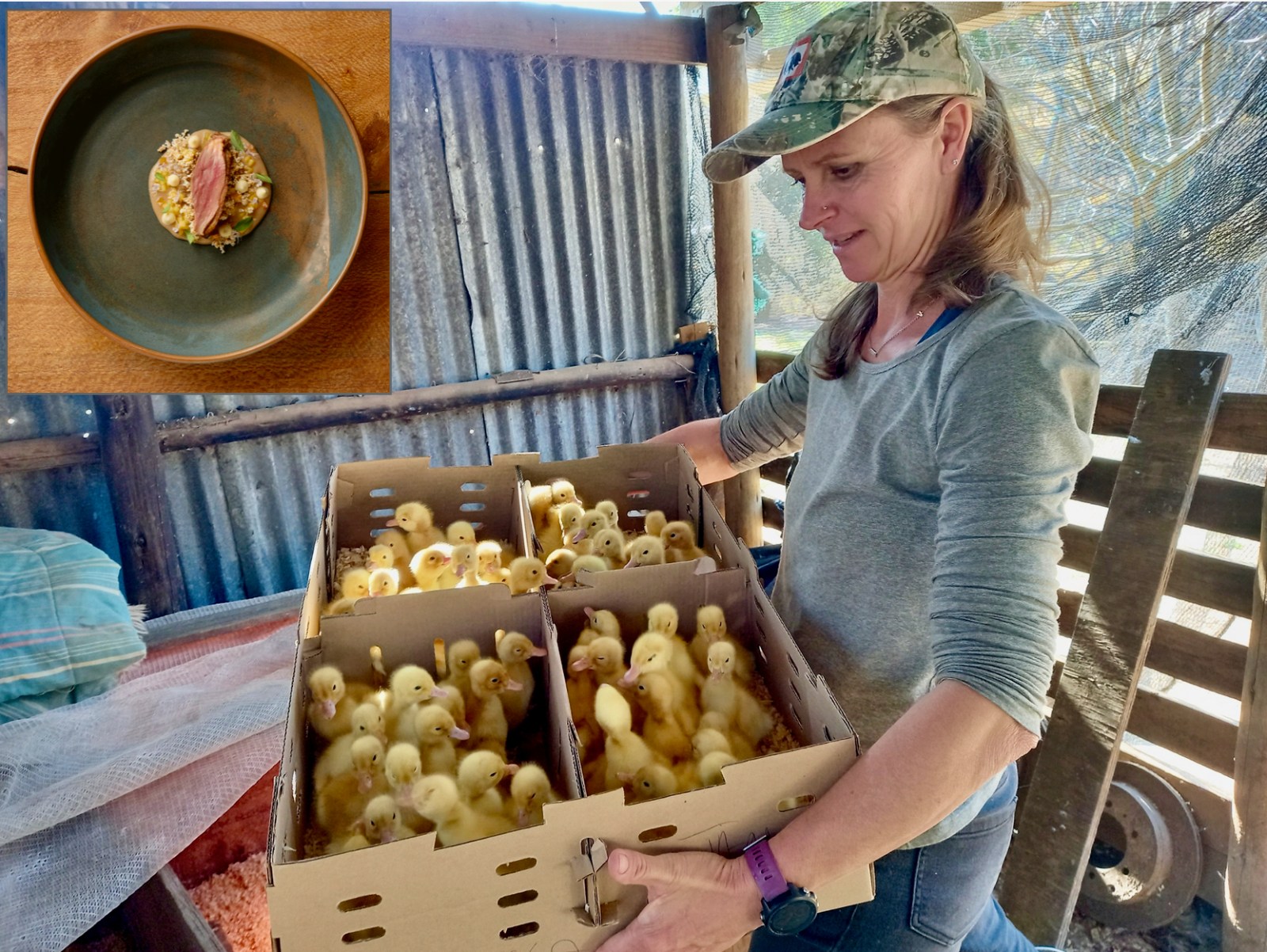
Vanessa with day-old Pekin ducks about to go into their Gerald-the-cat-proof brooding house (Photo: Wanda Hennig); inset, a Vanessa’s duck dish with peaches and African grains from Chef Johannes Richter at The LivingRoom. (Photo: JoNo Nienaber)
The sign she has in the opening pic, above, gets unwrapped during our time together. I ask her to hold it, suspecting few if any readers will get to see it any other way or in any other place. Because you’ve probably guessed by now that The Blue Orange Farm is not the most get-at-able destination.
And there is another reason this is likely to be your sole sign sighting. “We are a niche market. I don’t look for new customers. They find me. Word-of-mouth and Google.” And absolutely not randomly by happening to drive past.
The two-week-olds we stop to see first are in their shelter for protection. Collocott lost 50 chicks out of a batch of 200 to predators in the farm’s early days when she idealistically had them out and about, free and running all over. “I’ve got a gymnogene (African harrier-hawk) and two jackal buzzards that roost in the forest.
“And then I’ve got a serval cat and a caracal cat (not to mention Gerald the cat; more on him to come) and we’ve got mongooses. So we’re full up on predators.”
And bird noises. More than I was aware of while there, I note when listening, back home, to the taped bits of our conversation. Including the roosters, “which run around the farm looking pretty. They eat a lot and sleep in the trees. They’ve figured out how to keep away from the predators.”
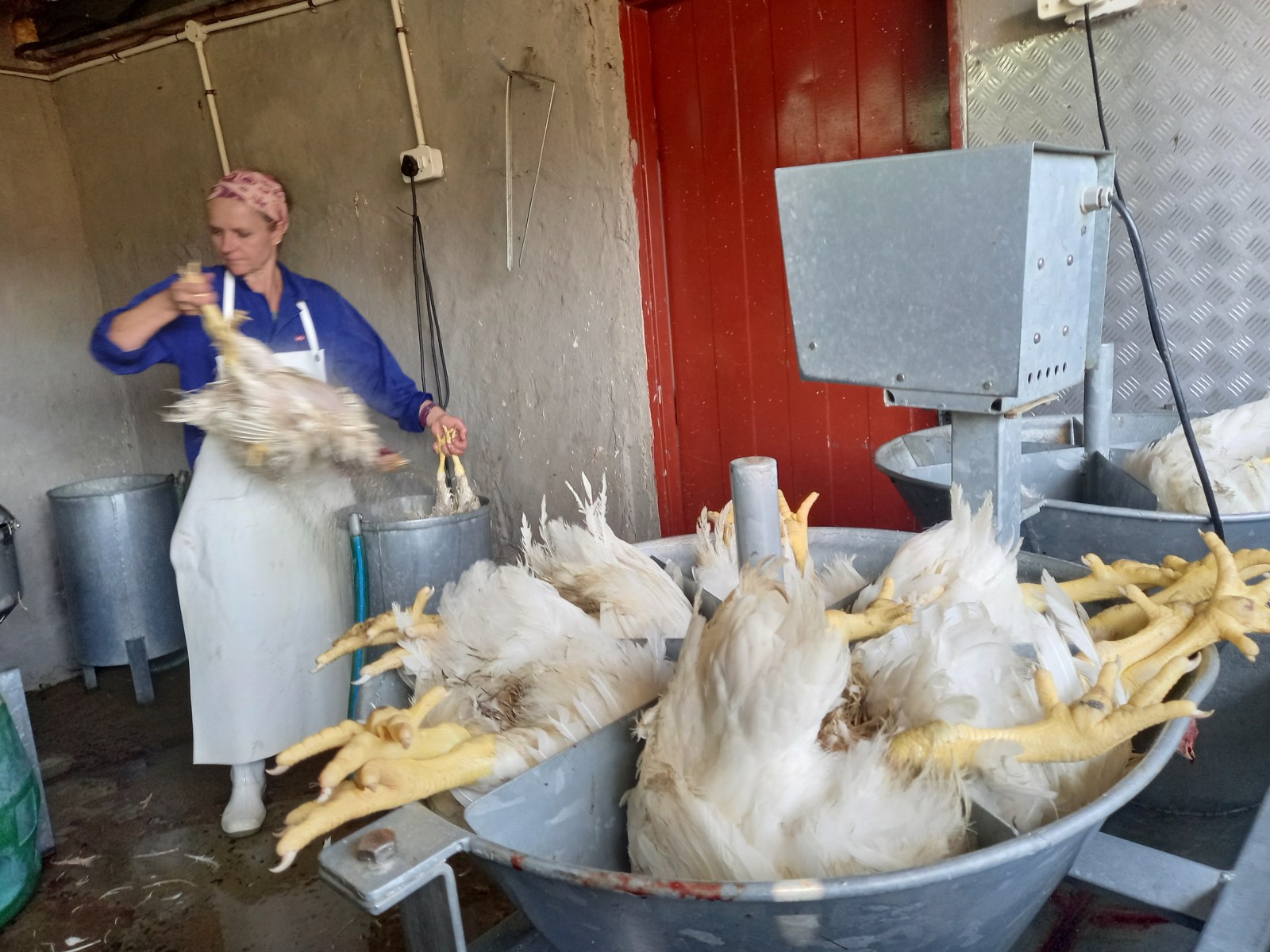
It is a quick, humane and minimal-stress trip from the pasture outside to farmer Vanessa Collocott’s rural abattoir. (Photo: Wanda Hennig)
Their morning wake-up calls go on through the day and into the afternoon when I watch some of them, plus a resident kite, doing their not-very-successful best to snatch a few scraps of bloody chicken entrails from three enormous happy pigs, which live in the field above the lake. They arrived as piglets. Now they’re part of the farm’s “furniture”. Part of the cycle of life in which everything not en route to a human tummy makes its way back into the soil.
The chickens, the ducks, “they are in the field until I’m ready to call for them. This makes it stress-free for the animals.” And as humane as it gets.
Vanessa, born in Switzerland, grew up in the Midlands, in the Merrivale part of Howick. She moved to Margate after school to work as a waitress while figuring out what to do with her life. Not wanting to be “one of those who are born, grow up, get married, die in Howick,” she says of her early eagerness to leave.
She met Kevan Collocott, whom she would marry, in Margate. He is operations manager for a Swiss-based company where the focus, broadly, is regenerative farming, same as what she’s doing in a small-scale hands-on way. He helps on the farm. Builds the mobile coops for the chickens and the ducks. Does whatever else is needed. “But here, I’m the chief,” she laughs. “You can’t have two decision-makers.”
The couple have a daughter, currently spending a gap year on the farm from her medical studies at Wits. Their son is finishing off fourth year computer engineering in Pretoria. “It’s great to have bright children,” she says appreciatively.
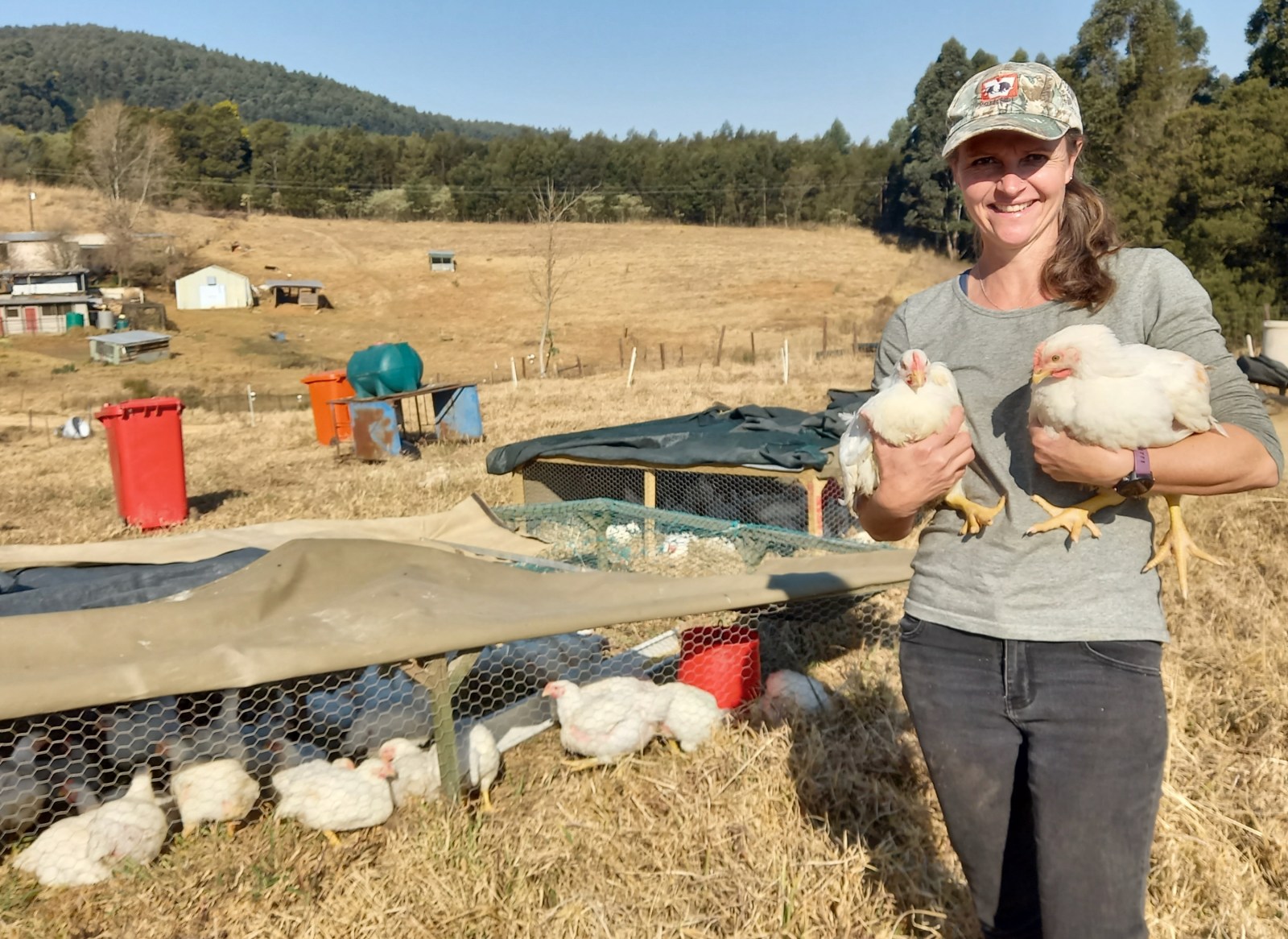
Every step is traceable and ethical for Vanessa’s broiler chickens (and Pekin ducks) at The Blue Orange Farm. (Photo: Wanda Hennig)
Back to those early days, Kevan was working for a multinational, “which allowed us to expat for 10 years. Durban, Cape Town, Zambia, Cape Town, Israel, Angola…” Vanessa reels them off.
“We bought this place between [living in] Israel and Angola. It was our ‘living the farm dream’ place. A ‘lifestyle property’, which sounds very romantic. But then you find it costs a lot to run so it has to generate income.”
First, before they physically moved there, they tried farming a small herd of Nguni cattle. But that didn’t work for them financially.
“Then we invested in a flock of Boer goats.” But these weren’t profitable enough to sustain an income either.
“Then I started with a couple of chickens for my own table because I also question where my food comes from.” The chickens, followed by the ducks, grew from there.
And in fact, pre-Covid she was doing a lot more of them. Taking the chickens and ducks to an abattoir elsewhere to be slaughtered. Sending out big orders, including to Cape Town.
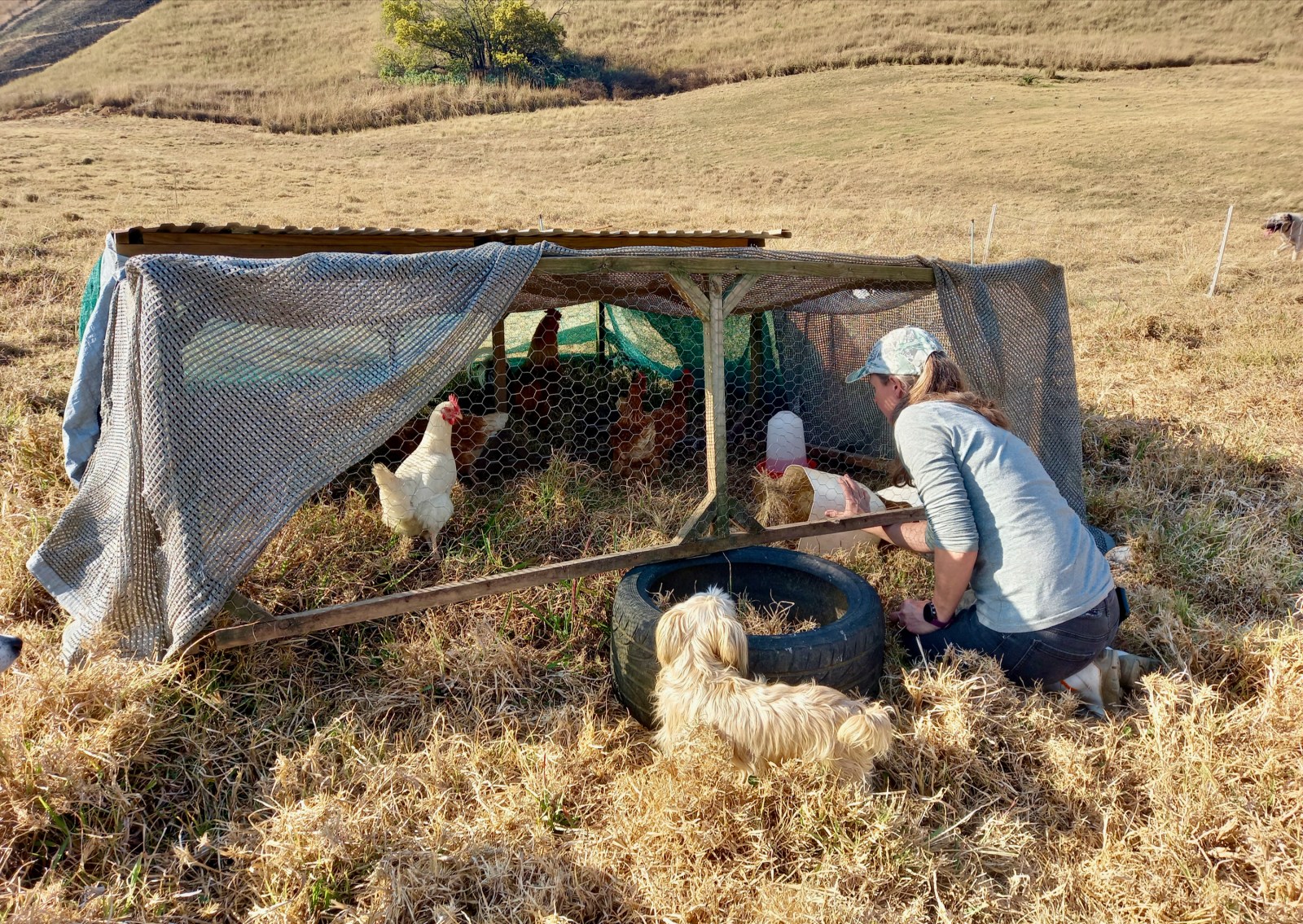
Vanessa’s pasture-raised broiler chickens live the life in their mobile coops, outdoors and protected from predators. (Photo: Wanda Hennig)
She stopped farming the ducks for two years during Covid. Generally reduced her output. Decided to focus on quality over quantity and make a move from the Cato Ridge abattoir she was driving to three times a week to her rural on-the-farm do-everything-yourself abattoir.
“Covid told me to get out of my comfort zone.” To do the meat examiner’s course required if she was to open a rural abattoir, right there, close to the farmhouse and the dams and the pigs and the fields and the romping farm dogs and everything else involved in what is a true working lifestyle farm.
And yes, “it is physically intensive work. It can take it out of you. But I hate any form of structured exercise and this is better than gym.”
Following the examiner’s course, she says, a meat inspector came to train the staff. All two of them. And moving forward, as in now, a government health inspector comes once a month to check compliance, cleanliness. “To make sure there’s boiling water to sterilise the knives, check the fly screens, the paint, the whole abattoir and processing area. Make sure there are no health issues.” To make it in poultry, you have to be niche or very big, she says. She’s choosing niche.
When we break for coffee and lunch on the porch — chicken sandwiches made from leftover bits cut during deboning, flatties being something new they’ve added — Gerald the marmalade cat rubs and prods from atop the lunch table, looking for love. Sharing the table-top space with Flea, the elderly white Maltese-type pooch that goes everywhere with Vanessa. While the bigger dogs laze and bound, she tells me that Gerald, this seemingly sweet affectionate being, knocked off five ducklings the previous week. Gerald the predatory cat. They’ve learned to make their duckling enclosure Gerald-proof, because “Gerald-proof means it’s everything-proof.”
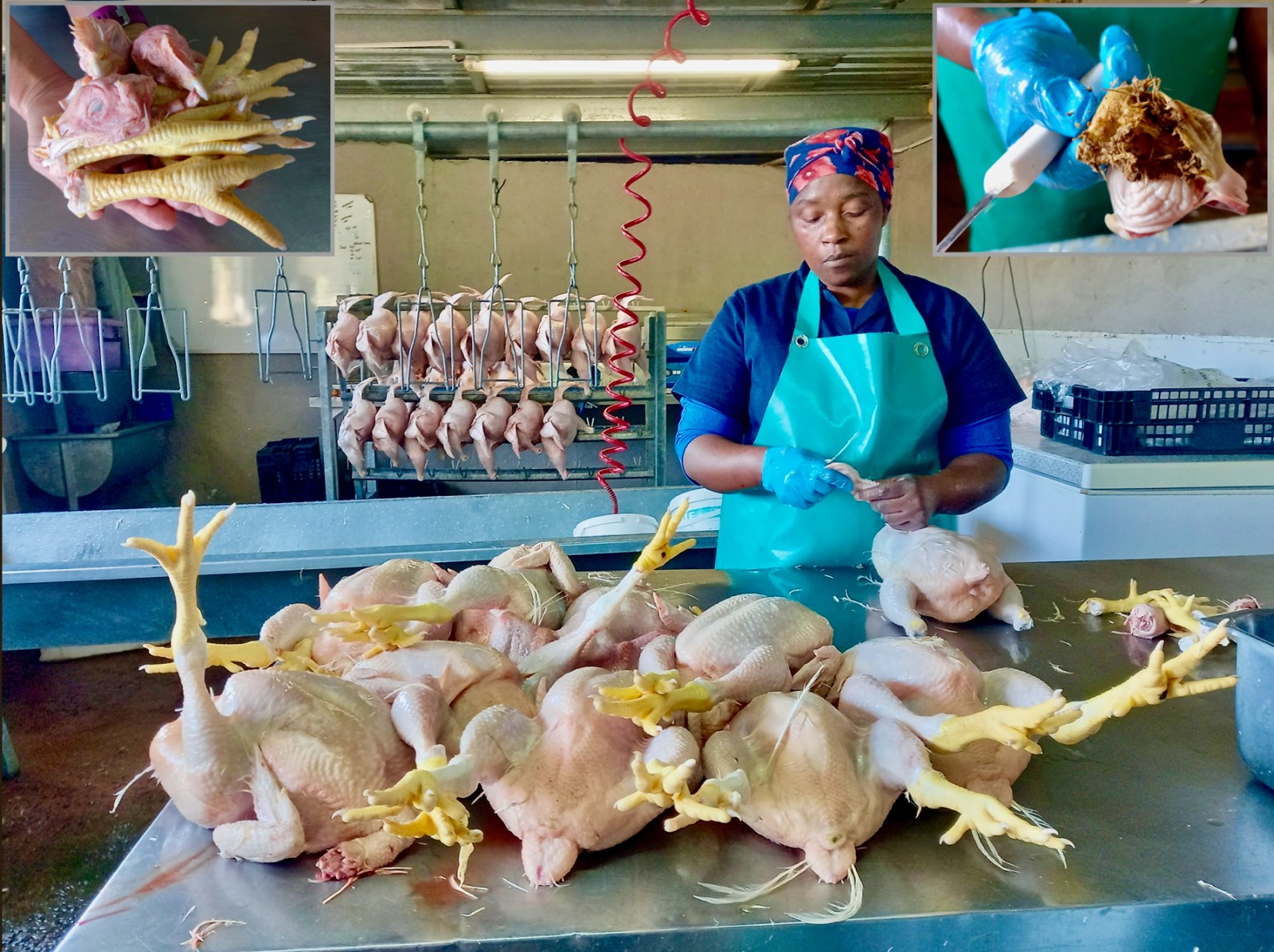
A whizz at processing, Happy Zuma prepares the walkie-talkies, inset top left, and shows the grassy proof of ‘free range’ in a chicken’s stomach, top right. (Photo: Wanda Hennig)
Vanessa, in the abattoir, works alongside assistant Happy Zuma, who is a whizz with a knife, the cleaning, the processing, the separation of the edible giblets — the liver, heart, neck and stomach, the delectable walkie-talkies, the deboning of flatties — from the lungs and crop, for instance, as in those bits not for human consumption.
No chicken is ever frozen, except on request. All stay in the field until processed, always in response to orders.
The broilers are pastured in the same field as the farm’s layers, which give them breakfast eggs in the morning and which Vanessa describes as “funny and with more personality than the broilers”.
“Broiler chickens are stupid,” she observes fondly, picking up two on request for my photograph. “They’re genetically designed simply to eat and put on weight (and then be eaten).”
Ducklings, unlike chickens, are easy to brood, she says. “Ducks also have more personality.”
Happy, who likes to “talk chicken” and share her skills, previously worked at a big poultry farm near Pietermaritzburg where they did about 5,000 chickens a day. Serendipitously she came to Vanessa as a twice-a-week cleaning lady, just before Covid. Readily, happily and effectively transitioned to the poultry during Covid.
While I’m there, farmworkers from neighbouring farms come to buy the walkie-talkies, giblets that aren’t going back into the chickens and various other offcuts. Vanessa and Happy also make a weekly trip to a nearby township taxi rank where Happy handles a micro roaring trade in chicken-bit sales. Running such a niche business, truly every bit of every bird is valued. No bit goes to waste.
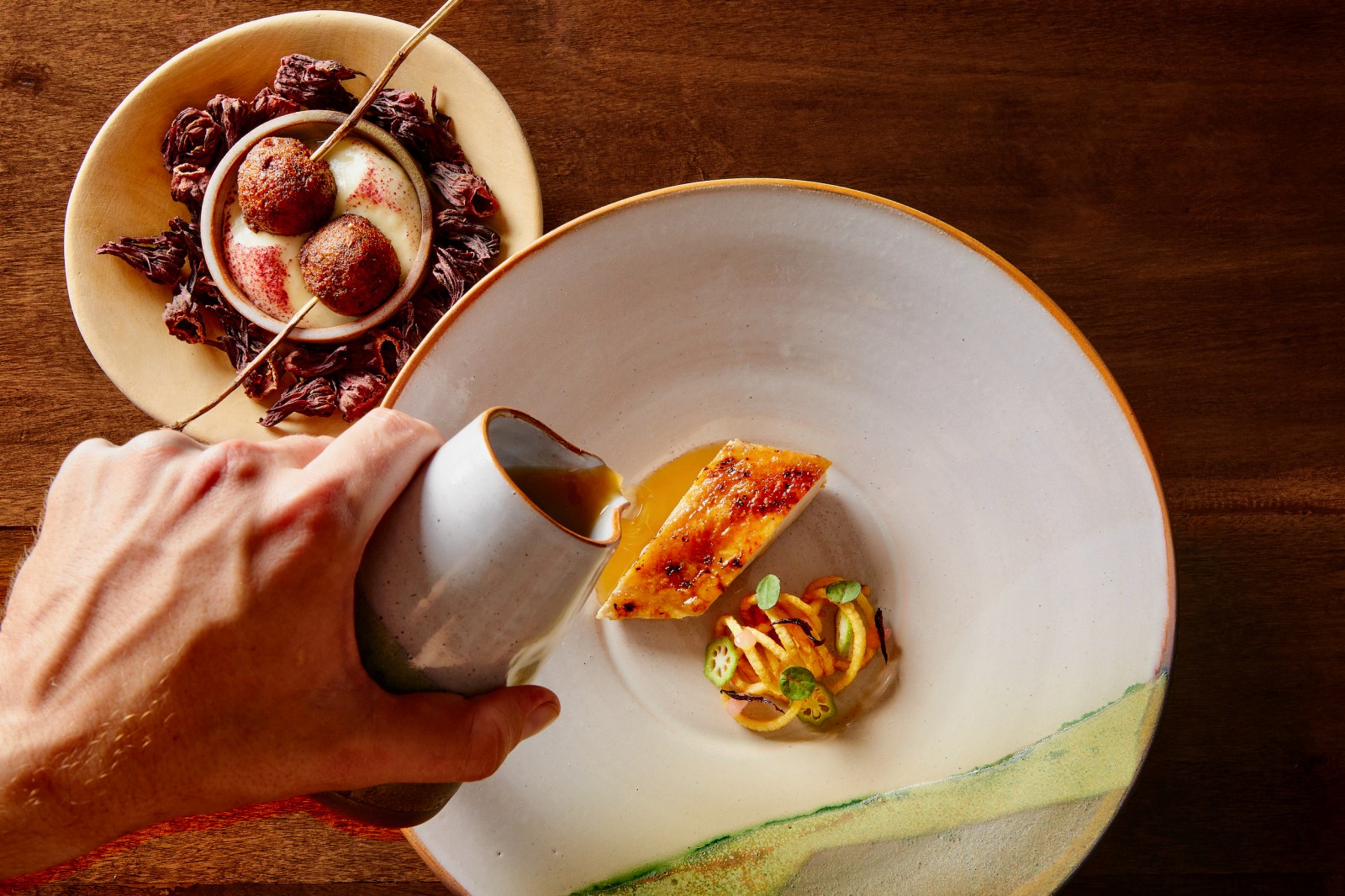
On a recent menu from SA’s top chef Johannes Richter at The LivingRoom: Vanessa’s chicken, up-to-date potatoes and roselle plus best-bits croquettes of chicken. (Photo: JoNo Nienaber)
“What makes Johannes buy your ducks?” I ask Vanessa, keen to hear her take on why Johannes Richter, SA’s top chef, chooses her birds for the menu at SA’s top restaurant. The LivingRoom in Pinetown. “Well, I think, hopefully the quality. And that I am a small producer, not commercial. He’s been here. Seen how I do things.” Knows she’s genuinely small-scale and about her focus on quality of life during the animal’s lifespan and the quality of the animal after that.
“Obviously ethics plays a huge role,” Richter tells me when I ask him. “And a byproduct of raising chicken and duck or poultry in general ethically is that the meat is more flavourful and there’s a consistency because a) the chicken and the duck get free movement and b) obviously the birds get no steroids or bulking agents as do most of the analogue chickens you get everywhere in this country from restaurants to supermarkets to butcheries. That doesn’t happen. These birds get a lot more time. They get to move. And the right food, a large portion from pasture giving them a completely different texture and depth in flavour.”
Chef Jackie Cameron, meanwhile, has been using The Blue Orange Farm chickens and ducks since she opened her school. “We say ‘Midlands’ chicken on our menus because guests get confused. Is it blue chicken or orange chicken?” she laughs.
How it came about, how they connected, Jackie had a student who lived near Blue Orange. And of course, as a chef, long before she opened her school and “long before it became fashionable”, she was doing “local, locavore, pasture-raised beautiful quality meat”.
“When you drive around and you see the pastures and you see the beautiful fields these animals are eating off, it just made sense. And because I was in the Midlands for so long, I got to know the farmers and for me it was also important.”
Her students don’t cook chicken until they’ve gone to the farm, met the farmer and seen the chickens on the farm and the farming process. “I just love Vanessa’s way. The quality of her chickens and her ducks, they just cook so beautifully. And Vanessa is a fantastic person. Honest, upfront. We understand the lead-lines to get her birds if we have big orders coming in.
“I like how/that she slaughters, how everything is controlled on the property. All done by her hand and her staff’s hand. I’m not of a hippy good-vibes mindset but I do feel a happier living chicken, egg, whatever it might be, will be better in your system and make you a happier person, plus there is the nutritional content and all of that. And that the integrity of the product overweighs the desire for money in the pocket.”
The Blue Orange Farm was named kind of randomly, in case you’re wondering: “It’s pretty much a play on words. Quirky. People remember it, blue and orange both being colours but you don’t get blue oranges. And there may have been a bit of wine involved in the decision-making…” Vanessa tells me when, while writing this piece, I get back to her and ask her. Thinking back to the sunshine, the smells, the sounds and the mellowness… That chicken sandwich we had for lunch. It truly did taste good. DM
Follow The Blue Orange Farm on Facebook and on Instagram.
Follow Wanda on Instagram wanda_hennig






 Become an Insider
Become an Insider
While living conditions on Vanessa’s farm may be humane, having your throat slit is hardly humane. Also, she buys the baby chicks from commercial farmers, where the birds suffer immeasurably. She supports this inhumane industry, where chickens get their sensitive beaks cut off, and day-old male chicks either gets put on a conveyor belt leading to a grinder that grinds them up alive, or they get burnt alive. Some factory farms simply throw the male chicks in plastic trash bags where they are left to die a slow and agonising death. So where do you draw the line? Just because Vanessa’s birds suffered less than their parents at a factory farm, does not mean it is now ok to slit their throats and exploit them for food. If it is not OK to eat a dog, why is it OK to eat a duck? It is a bias that was set by the (highly profitable) meat industry, and we grew up with that bias, we are all essentially brain-washed. If she farmed labrador puppies, raised them and then slaughtered them for food, nobody would buy her product and she’d be labelled crazy and cruel. But because we like the taste of duck, we now lie to ourselves that suddenly this is “humane”. All animals raised for food, are exploited. If you want to know whether anything is “humane”, consider whether you’d want it done to you. Would you like to be bred for food and have your throat slit at the end of a relatively free life? A chicken is a dog is a boy. Believing we can inflict harm on other species is morally wrong.
What else would you prefer us to eat? Broccoli and beans? Or some other less appetising Vegan foods? Don’t get me wrong I like vegetables; but in moderation.
You can’t buck against where you came from. After millions of years, we hominids, have evolved into omnivores, like it or not. You cannot change where we came from. It is the eating of meat and bone marrow, which grew our big brains and allowed us to use our brains to achieve the scientific marvels in medicine and other wonderful achievements in science – would you have preferred to have inherited the tiny brains of our distant shrew-like ancestors, who came out of their burrows and thrived after the majority of dinosaurs were were killed and were made extinct by the huge asteroid which struck the earth some 165 million years ago. Read all about it in many scientific journals – this is not a man-made myth but a scientific truth, fully backed up by the proof of investigations and irrefutable physical evidence and also evidence written in to our dna. This is a truth backed up by evidence. Read all about it – the human genome is a facinating subject to all of us, willing to read about it with an open mind for understanding of this wonderful account of mankinds origins.
Another matter to be investigated by Vegans : It seems to be strange that children brought up as vegans do not realise their full potential in brain or body development without access easily digestable animal protein. We are what we are…
Couldn’t have said it better!
Such bigoted and myopic views. No, I don’t eat labrador puppies, I certainly ear chicken and duck!